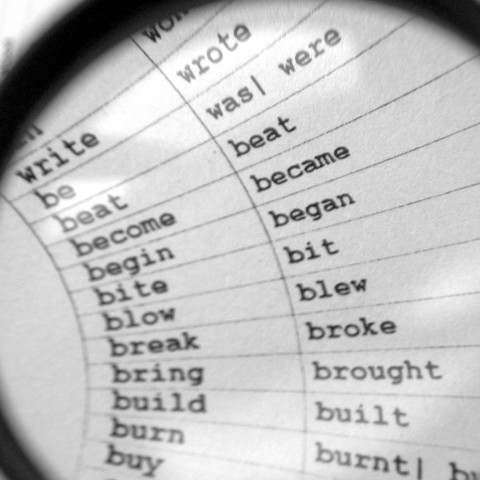
Grammar seems to be one of the least inviting parts of language learning, but it’s like stretching after exercise or checking the air in your tires before a trip: it’s something essential you have to give your attention to if you want to ensure success.
As you learn about Hebrew verb tenses in particular, you’ll find that Hebrew grammar is actually easier than many other languages. In fact, though other linguistic means can be used to express things like conditionals, the Hebrew language has only three real tenses: simple past, simple present, and simple future. That’s right! No progressives, no perfect tenses, and no compound tenses to trip you up.
Hebrew is known for its economy, in the sense that it gets a lot of mileage out of limited language elements. The case of tenses is no exception. Although there are only three main tenses, Hebrew makes use of extra descriptors (such as time cues) for nuance; these help distinguish between a past event that just happened versus one that occurred some time ago, for instance.
In the following article, we’ll be looking at how to form the three Hebrew tenses, along with helpful examples that illustrate their use. Note that many Hebrew learners like to start learning the tenses by first mastering one tense (typically the present), and only then moving on to the rest.
Let’s jump right in!
 Table of Contents
Table of Contents
- The Hebrew Present Tense
- The Hebrew Past Tense
- The Hebrew Future Tense
- The Top 5 Things You Need to Know About Using the Tenses in Hebrew
- Verb Conjugation Overview
- Let HebrewPod101 Make Your Future Plans for Hebrew Happen in the Present!
1. The Hebrew Present Tense

In modern Hebrew, the present tense is used for anything that is happening right now, as well as for generally repeated actions or states such as habits. Unlike in English, there are no progressive or perfect present forms in Hebrew; these are expressed using context and time cues. It’s also important to note that there’s no form of the verb “to be,” or להיות (lehiyot), in present tense; it’s simply omitted.
Without further ado, let’s have a look at which words and phrases are commonly used with the present tense, along with examples of how it’s used.
- 1. עכשיו
‘Akhshav
“Now”
אני אוכל עכשיו.
Ani okhel ‘akhshav.
“I’m eating now.”
- 2. בדיוק
Bediyuk
“Right now”
*Note that this same word can be used to say “exactly.”
אני בדיוק עולה לרכבת.
Ani bediyuk ‘oleh la-rakevet.
“I’m getting on the train right now.”
- 3. כרגע
Karega’
“At present”
אני לא עובד כרגע.
Ani lo ‘oved karega’.
“I’m not working at present.”
- 4. תמיד
Tamid
“Always”
אני תמיד קורא לפני השינה.
Ani tamid kore lifney ha-sheynah.
“I always read before bed.”
- 5. כל יום/שבוע/חודש/שנה
Kol yom/shavu’a/khodesh/shanah
“Every day/week/month/year”
אני עושה כושר כל יום.
Ani ‘oseh kosher kol yom.
“I do exercise every day.”
*Note the difference between כל יום (kol yom), meaning “every day,” and כל היום (kol ha-yom), meaning “all day.”
2. The Hebrew Past Tense

In Hebrew, the past tense is used to express any completed action or state. There are no progressive or perfect past forms in Hebrew, so these are expressed using context and time cues. Below is a list of the most common words and phrases used with the past tense, along with sample sentences.
- 1. אתמול
Etmol
“Yesterday”
אתמול אכלתי במסעדה.
Etmol akhalti be-mis’adah.
“Yesterday, I ate at a restaurant.”
- 2. בדיוק
Bediyuk
“Right now”
בדיוק עלית לרכבת.
Bediyuk ‘aliti la-rakevet.
“I just got on the train.”
- 3. לא מזמן
Lo mizman
“Not long ago”
לא מזמן ראיתי אותך בתל אביב.
Lo mizman ra’iti otakh be-Tel Aviv.
“Not long ago, I saw you in Tel Aviv.”
- 4.כבר
Kvar
“Already”
כבר קראתי את העיתון היום.
Kvar karati et ha-‘iton hayom.
“I already read the newspaper today.”
- 5.לפני שעה/יומיים/חודש/שנה
Lifney sha’ah/yomayim/khodesh/shanah
“An hour/two days/a month/a year ago”
טסתי להודו לפני שנה.
Tasti le-Hodu lifney shanah.
“I flew to India a year ago.”
3. The Hebrew Future Tense

In Hebrew, the future tense is used for any planned or projected action or state. There are no progressive or perfect future forms in Hebrew, so these are expressed using context and time cues. Note that many times, in Hebrew, we simply use one of these time or context cues with the present tense rather than the future, especially to express plans. This is akin to the use of the present progressive in English, which is used to express plans. Below is a list of the words and phrases most commonly used with the Hebrew future tense, as well as examples illustrating their use.
- 1. מחר
Makhar
“Tomorrow”
מחר אסע לצפון.
Makhar esa’ la-Tzafon.
“Tomorrow, I’m going to the North.”
*Note that, as mentioned, this same plan could be expressed using the present tense with the same time cue, as follows:
מחר אני נוסע לצפון.
Makhar ani nose’a la-Tzafon.
“Tomorrow, I’m going to the North.”
- 2. בקרוב
Bekarov
“Soon”
אנחנו נתחתן בקרוב.
Anakhnu nitkhaten bekarov.
“We’ll be getting married soon.”
- 3. עוד מעט
‘Od me’at
“In a while”
עוד מעט נגיע הביתה.
‘Od me’at nagi’a habaytah.
“We’ll get home in a while.”
- 4. כבר
Kvar
“Already” / “In no time”
כבר תהיה ילד גדול.
Kvar tihiyeh yeled gadol.
“You’ll be a big boy in no time.”
- 5. בעוד שעה/יומיים/חודש/שנה
Be-‘od sha’ah/yomayim/khodesh/shanah
“In an hour/two days/a month/a year”
בעוד חודש אהיה בחופש.
Be-‘od khodesh eheyeh be-khofesh.
“In a month, I’ll be on vacation.”
4. The Top 5 Things You Need to Know About Using the Tenses in Hebrew

Now that you’ve seen some of the most common words and phrases to use with the three main tenses in Hebrew, let’s sum up by looking at the top five things you need to know in order to use the Hebrew verb tenses correctly.
1. The verb “to be” is omitted in the present tense.
As mentioned earlier, there’s no form of the Hebrew verb להיות (lehiyot), or “to be,” in the present tense. But don’t worry! All you need to do is omit it (marked in the example with [-]). Here’s an example to illustrate:
- המרק הזה חם מאוד.
Ha-marak ha-zeh [-] kham me’od.
“This soup is very hot.”
2. There are no progressive, perfect, or compound tenses in Hebrew.
Unlike English, which has a whopping 12 tenses, Hebrew relies almost entirely on just three. For instance, the Hebrew equivalent of the English sentence “I am going to go” would be either “I go” or “I will go.” The same is true for the past tense: “I have been wondering” in Hebrew would just be “I wondered” or “I wonder.”
Remember that to clarify and express finer nuances of time, we rely on time and context cues like the words and phrases outlined above.
3. The present tense can be used to express future plans or projections, approximating English’s -ing structure.
Just as English will often make use of the present tense to express future plans or expectations, Hebrew also makes frequent use of the present tense to express the future. For example, if you plan to rest tomorrow, you can say it in either future or present tense:
- מחר אנוח.
Makhar anu’akh.
“Tomorrow, I’m going to rest.”
(FUTURE TENSE)
OR
- מחר אני נח.
Makhar ani nakh.
“Tomorrow, I’m going to rest.” (Literally: “Tomorrow, I rest.”)
(PRESENT TENSE TO EXPRESS FUTURE)
4. The verb ללכת (lalekhet), or “to go/walk,” can be used to talk about future plans in the same way that English uses “going to.”
Hebrew often uses the verb ללכת (lalekhet), which literally means “to go” or “to walk,” as an auxiliary that has the same meaning it does in English when used to talk about future plans. Here’s an example:
- אני הולך לראות סרט עם חברים הערב.
Ani holekh lirot seret ‘im khaverim ha-erev.
“I’m going to see a movie with friends this evening.”
5. The subjunctive mood can be expressed by combining a past tense form of the verb להיות (lehiyot), or “to be,” with another verb in the present tense.
The subjunctive mood is used when talking about hypothetical situations or things we would like to happen. Where English uses modal verbs like “could” and “would” or verbs of desire like “wish” and “like,” Hebrew combines the past and present tenses, with the verb להיות (lehiyot), or “to be,” in the past and another main verb in the present. Here are a couple of examples:
- הייתי רוצה אוטו יותר חדש.
Hayiti rotzeh oto yoter khadash.
“I wish I had a newer car.” (Literally: “I would like a newer car.”)
היית אוכלת בשר כריש?
Hayit okhelet basar karish?
“Would you eat shark meat?”
5. Verb Conjugation Overview

Finally, although we’ve covered Hebrew verb forms and conjugations in depth in other lessons, such as this one, let’s just take a quick look at the following verb conjugation table as a reminder of how this looks across the tenses. For the purposes of this lesson, let’s use the verb לאכול (le’ekhol), or “to eat.”











